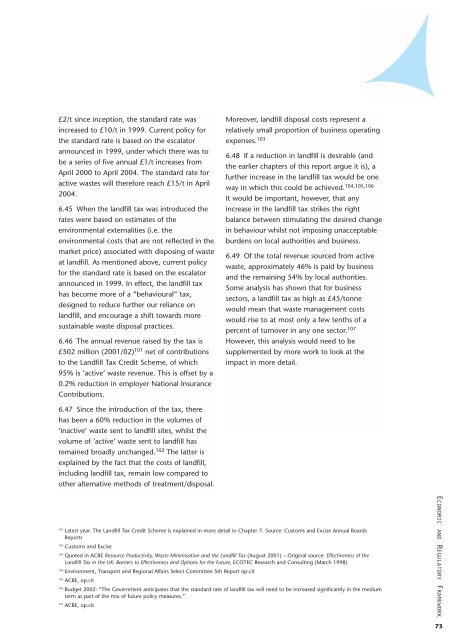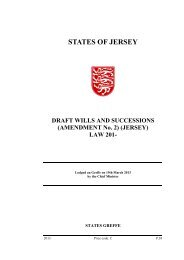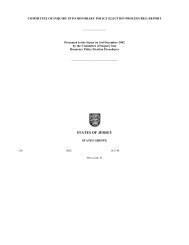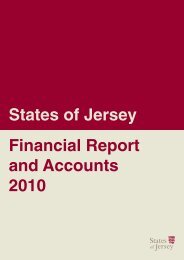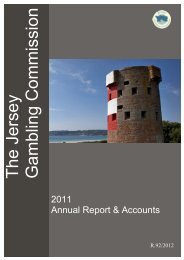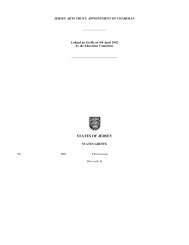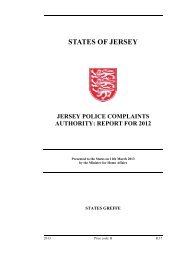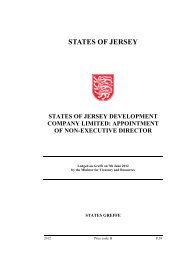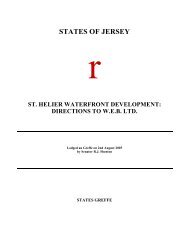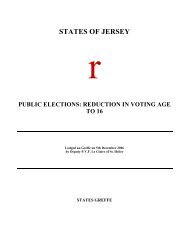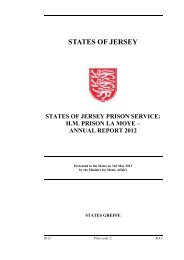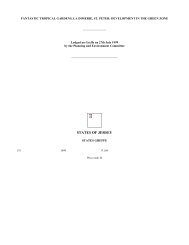Waste not want not - States Assembly
Waste not want not - States Assembly
Waste not want not - States Assembly
You also want an ePaper? Increase the reach of your titles
YUMPU automatically turns print PDFs into web optimized ePapers that Google loves.
£2/t since inception, the standard rate was<br />
increased to £10/t in 1999. Current policy for<br />
the standard rate is based on the escalator<br />
announced in 1999, under which there was to<br />
be a series of five annual £1/t increases from<br />
April 2000 to April 2004. The standard rate for<br />
active wastes will therefore reach £15/t in April<br />
2004.<br />
6.45 When the landfill tax was introduced the<br />
rates were based on estimates of the<br />
environmental externalities (i.e. the<br />
environmental costs that are <strong>not</strong> reflected in the<br />
market price) associated with disposing of waste<br />
at landfill. As mentioned above, current policy<br />
for the standard rate is based on the escalator<br />
announced in 1999. In effect, the landfill tax<br />
has become more of a “behavioural” tax,<br />
designed to reduce further our reliance on<br />
landfill, and encourage a shift towards more<br />
sustainable waste disposal practices.<br />
6.46 The annual revenue raised by the tax is<br />
£502 million (2001/02) 101 net of contributions<br />
to the Landfill Tax Credit Scheme, of which<br />
95% is ‘active’ waste revenue. This is offset by a<br />
0.2% reduction in employer National Insurance<br />
Contributions.<br />
Moreover, landfill disposal costs represent a<br />
relatively small proportion of business operating<br />
expenses. 103<br />
6.48 If a reduction in landfill is desirable (and<br />
the earlier chapters of this report argue it is), a<br />
further increase in the landfill tax would be one<br />
way in which this could be achieved. 104,105,106<br />
It would be important, however, that any<br />
increase in the landfill tax strikes the right<br />
balance between stimulating the desired change<br />
in behaviour whilst <strong>not</strong> imposing unacceptable<br />
burdens on local authorities and business.<br />
6.49 Of the total revenue sourced from active<br />
waste, approximately 46% is paid by business<br />
and the remaining 54% by local authorities.<br />
Some analysis has shown that for business<br />
sectors, a landfill tax as high as £45/tonne<br />
would mean that waste management costs<br />
would rise to at most only a few tenths of a<br />
percent of turnover in any one sector. 107<br />
However, this analysis would need to be<br />
supplemented by more work to look at the<br />
impact in more detail.<br />
6.47 Since the introduction of the tax, there<br />
has been a 60% reduction in the volumes of<br />
‘inactive’ waste sent to landfill sites, whilst the<br />
volume of ‘active’ waste sent to landfill has<br />
remained broadly unchanged. 102 The latter is<br />
explained by the fact that the costs of landfill,<br />
including landfill tax, remain low compared to<br />
other alternative methods of treatment/disposal.<br />
101<br />
Latest year. The Landfill Tax Credit Scheme is explained in more detail in Chapter 7. Source: Customs and Excise Annual Boards<br />
Reports<br />
102<br />
Customs and Excise<br />
103<br />
Quoted in ACBE Resource Productivity, <strong>Waste</strong> Minimisation and the Landfill Tax (August 2001) – Original source: Effectiveness of the<br />
Landfill Tax in the UK: Barriers to Effectiveness and Options for the Future, ECOTEC Research and Consulting (March 1998)<br />
104<br />
Environment, Transport and Regional Affairs Select Committee 5th Report op.cit<br />
105<br />
ACBE, op.cit<br />
106<br />
Budget 2002: “The Government anticipates that the standard rate of landfill tax will need to be increased significantly in the medium<br />
term as part of the mix of future policy measures.”<br />
107<br />
ACBE, op.cit<br />
ECONOMIC AND REGULATORY FRAMEWORK<br />
73


